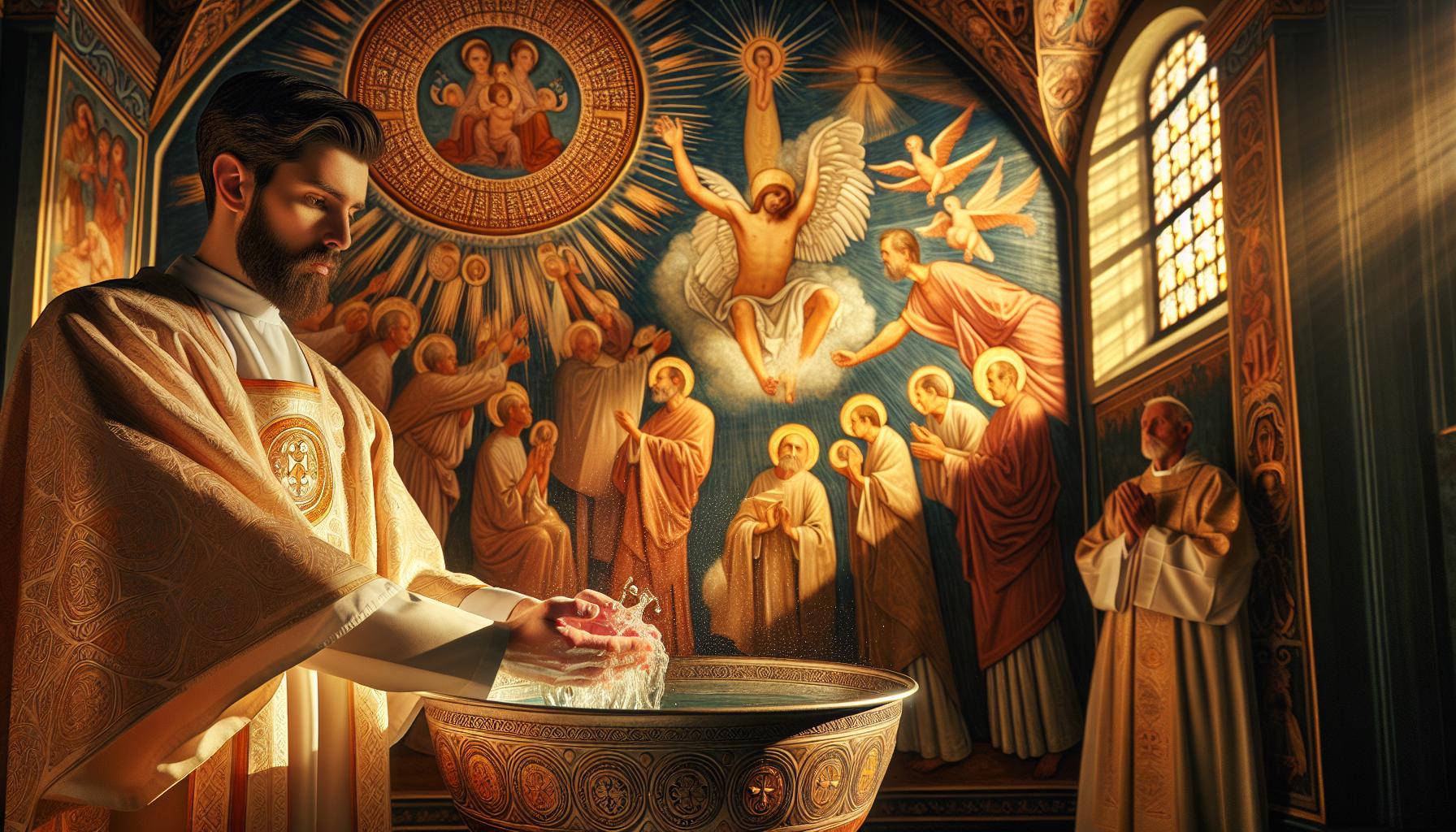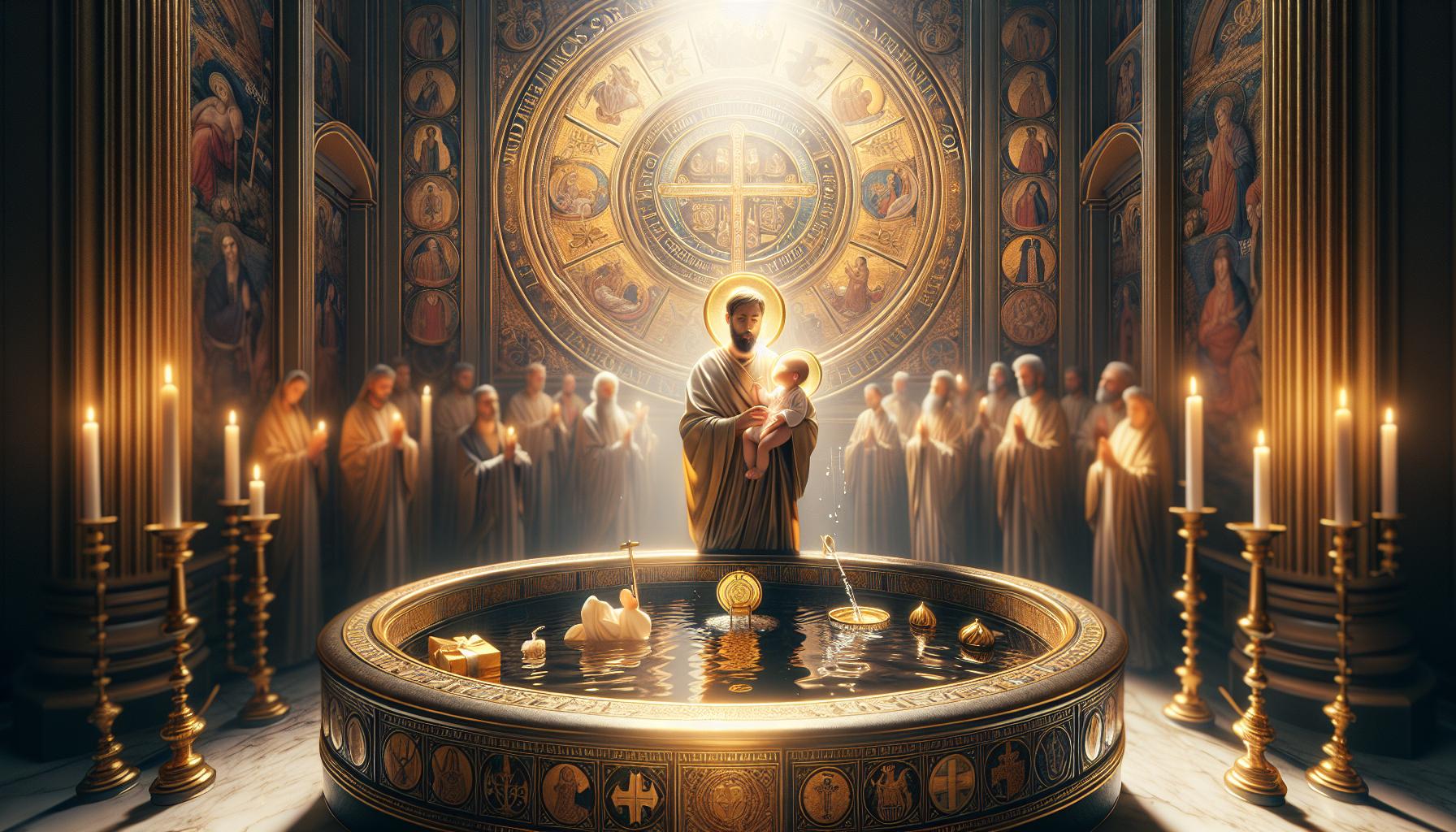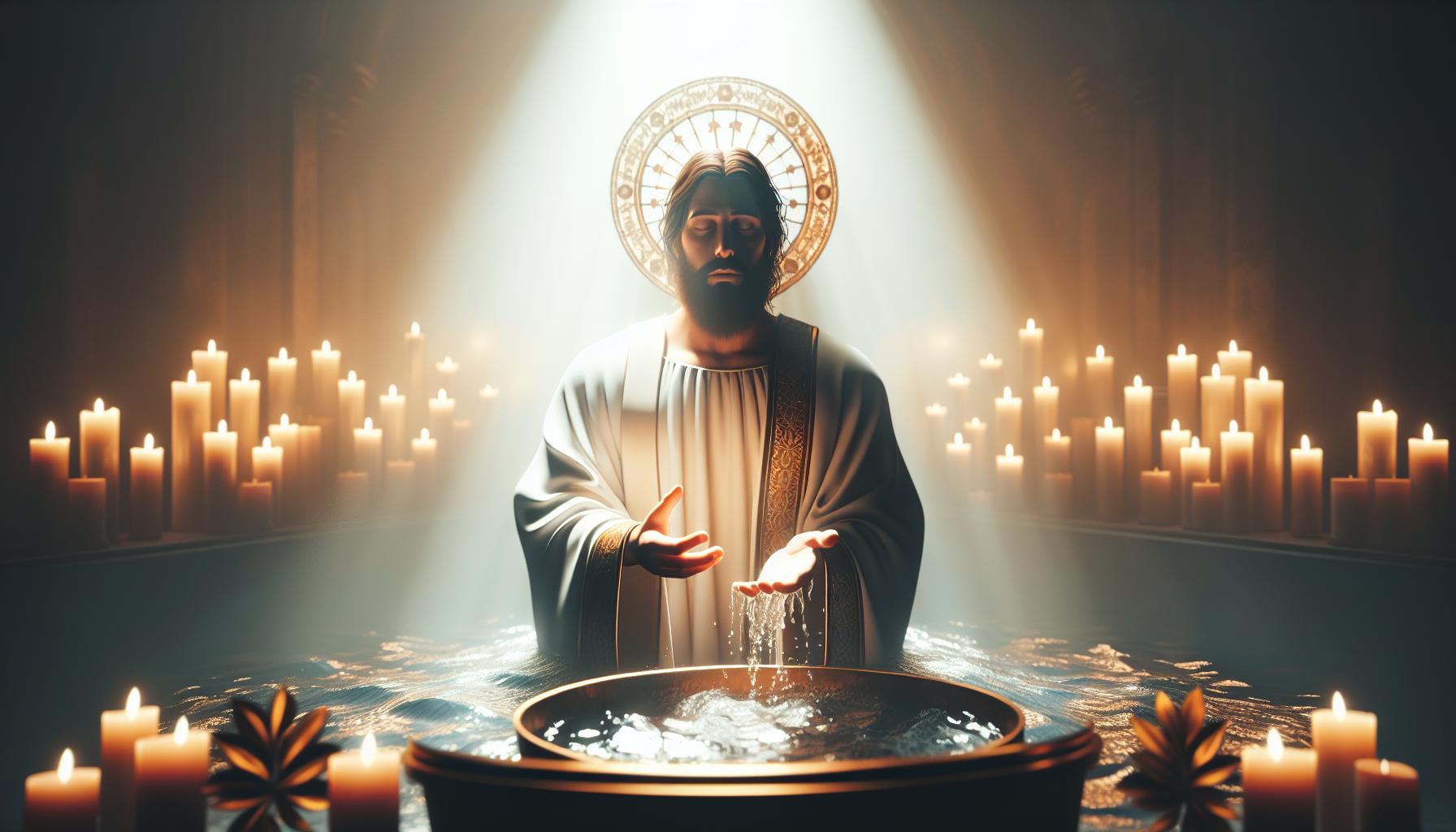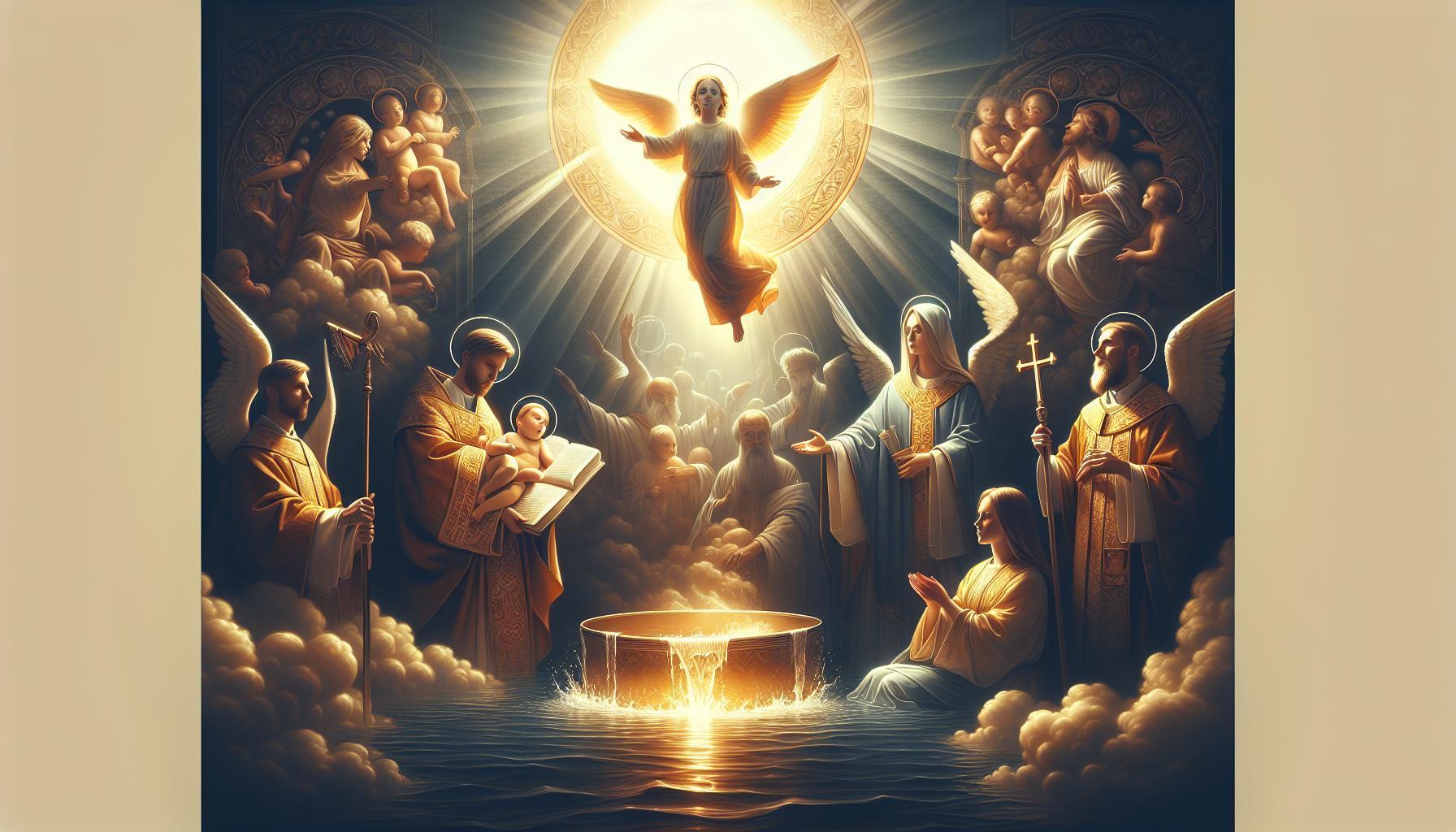Baptism holds profound significance in Christianity, yet many wonder what the Catholic Church truly teaches about it. This sacrament represents a gateway to spiritual rebirth and community membership, making its understanding crucial for both believers and those exploring their faith. Dive into the doctrine behind baptism and uncover its essential role in Catholic life.
The Significance of Baptism in Catholic Theology
Baptism stands as a cornerstone in Catholic theology, representing a profound entry into the life of faith and communion with God. For Catholics, this sacrament is not just a ritual but a transformative event, deeply woven into the fabric of Christian identity and community. It embodies the initiation into the Church and signifies a commitment to live in accordance with the teachings of Jesus Christ.
The Theological Foundations of Baptism
Central to understanding baptism in Catholicism are several key theological principles:
- Original Sin and Salvation: Baptism is believed to cleanse individuals from original sin, a doctrine that asserts humanity’s fallen nature. This sacrament restores one’s relationship with God, offering the grace necessary for salvation.
- Incorporation into the Church: Through baptism, an individual becomes a member of the Body of Christ, the Church. This communal aspect highlights the importance of being part of a larger faith community, emphasizing that faith is not solely a personal affair but a shared journey.
- Indelible Mark: The Catholic Church teaches that baptism leaves an indelible spiritual mark on the soul, signifying that the individual belongs to Christ forever. This mark cannot be erased, reinforcing the permanence of God’s call.
The Sacramental Grace of Baptism
The grace conferred through baptism is vital in Catholic belief. It is viewed as a means of spiritual rebirth, akin to the experience of Nicodemus in the Gospel of John (3:5). This rebirth is not merely symbolic; it is a real transformation affecting the individual’s relationship with God and with others.
| Baptismal Effects | Description |
|---|---|
| Forgiveness of Original Sin | This restoration is essential for salvation and allows the faithful to begin anew in their relationship with God. |
| Entrance into the Church | Baptism explicitly makes one a member of the Christian community, reflecting the belief that faith flourishes in communal life. |
| Spiritual Adoption | The baptized are considered children of God, highlighting the intimate connection with the divine. |
As the faithful reflect upon the question of what the Catholic Church believes about baptism, they find a robust doctrine that emphasizes the sacrament’s essential role in personal and communal faith. Recognizing these elements not only enriches individual understanding but also reinforces the collective commitment to living out the Gospel in everyday life. Thus, baptism in Catholicism emerges not just as an initial step but as a profound foundation upon which the journey of faith is built.
Understanding the Sacramental Nature of Baptism
Many people view baptism merely as a rite of passage or a ceremonial event, yet within the Catholic faith, its essence runs much deeper, revealing profound truths about identity and belonging. This sacrament does not just signify the washing away of sins; it acts as a transformative encounter with God, initiating believers into a life of grace. Understanding the sacramental nature of this ritual illuminates its significance within the framework of ecclesiastical teaching, which fundamentally shapes how Catholics view their relationship with God and the Church.
The Sacramental Reality of Baptism
At the heart of Catholic doctrine regarding baptism lies its understanding as a sacrament—a visible sign instituted by Christ that confers grace. Unlike mere symbols, sacraments are seen as efficacious; they not only represent a spiritual truth but also actively communicate that reality to the recipient. Specifically, baptism marks the moment when an individual is spiritually reborn and becomes a member of the Christian community. It establishes a covenantal relationship between the baptized and God, rooted in love and divine mercy.
- Original Sin: Baptism cleanses individuals from original sin, restoring their relationship with God.
- Incorporation into the Church: Through baptism, individuals are officially welcomed into the Catholic Church, which is the body of Christ on Earth.
- Call to Apostolic Mission: The baptized receive a mission to carry forth the teachings of Jesus, spreading love and compassion.
Catechism Insights
The Catechism of the Catholic Church elaborates on the sacramental character of baptism, emphasizing its profound implications for the individuals involved. This teaching echoes the belief that baptism is not merely a ritual act but a deep, mystical incorporation into Christ. The baptized are called to live out their faith actively and are empowered by the Holy Spirit. This engagement involves participating in the liturgical life of the church, receiving other sacraments, and living in accordance with Christ’s teachings as articulated through scripture and tradition.
| Aspect of Baptism | Significance |
|---|---|
| Water | Represents purification and the Holy Spirit |
| Oil | Used to signify sanctification and the sealing of the Holy Spirit |
| White Garment | Symbolizes the purity and new life in Christ |
| Candle | Represents the light of Christ, illuminating the baptized’s path in faith |
serves as a gateway to appreciating the broader doctrine of the Church. It invites believers to reflect on their identity as children of God, called to live a life marked by grace, transformation, and communal responsibility. The implications of this sacrament extend well beyond the day of the ceremony, influencing everyday decisions and life choices as Catholics navigate their spiritual journeys within the Church.
Who Can Be Baptized? Criteria and Considerations
Baptism is not merely a ritual; it’s a profound declaration of faith, identity, and community within the Catholic Church. As the gateway to the sacraments and a transformative spiritual experience, understanding who can be baptized is crucial. The Catholic Church outlines specific criteria and considerations that reflect its beliefs about grace, divine mercy, and the inclusion of all people in the faith.
Who is Eligible for Baptism?
The Catholic Church welcomes individuals across various life stages and backgrounds to partake in this sacrament. Eligibility criteria can generally be categorized as follows:
- Infants: Infants are baptized to cleanse them from original sin and initiate them into the faith community. As the Church believes that God’s grace can precede faith, infants, regardless of their ability to express belief, can be baptized.
- Children and Adolescents: Those over the age of reason (typically seven years old) are prepared for Baptism through catechesis, where they learn about the faith and the significance of the sacrament.
- Adults: Adults seeking Baptism must undergo the Rite of Christian Initiation for Adults (RCIA), which involves a period of inquiry and formation in the faith before full initiation through Baptism.
Special Considerations
The Church also considers several important factors when it comes to baptism eligibility:
- Desire for Baptism: For those who can express faith, a genuine desire to be baptized is essential. This reflects the doctrine that faith is inherently personal and must be confirmed by the individual.
- Parental Commitment: In the case of infant baptism, parents or guardians must declare their willingness to raise the child in the Catholic faith, understanding their role in the child’s spiritual development.
- Non-Catholic Candidates: Individuals already baptized in another Christian denomination may be accepted for confirmation in the Catholic Church, but they are not re-baptized, as the Church recognizes the validity of their previous baptism.
Conclusion on Criteria for Baptism
The Catholic Church’s approach to baptism is one of inclusivity and compassion, affirming that all individuals—infants, children, adolescents, and adults—can participate in this sacrament. By fostering a sense of community and spiritual belonging, the Church emphasizes that Baptism is fundamentally about God’s grace acting within each person’s life, irrespective of their starting point. Understanding these criteria provides insight into the Church’s beliefs about Baptism and highlights its role as a cornerstone of the Catholic faith.
The Role of Godparents: Spiritual Support and Responsibilities
The inclusion of godparents in the sacrament of baptism is a deeply rooted tradition within the Catholic Church, reflecting a commitment that extends beyond simply being there on the day of the ceremony. Godparents are tasked with guiding the spiritual journey of the baptized individual, serving as important mentors and role models within the faith community. Their role embodies an enriching experience, both for the godchild and the godparent, promoting a lifelong relationship centered on faith.
Spiritual Guidance and Mentorship
The primary responsibility of godparents is to assist in the spiritual upbringing of their godchild. This relationship fosters an environment where faith can flourish through active mentorship, prayer, and example. Godparents are expected to:
- Lead by Example: They should exemplify the teachings of the Catholic Church in their daily lives, demonstrating what it means to live out the values of their faith.
- Encourage Participation: Actively encourage their godchild to participate in church activities, such as Mass, religious education, and community service.
- Offer Support: Provide emotional and spiritual support throughout the godchild’s life, guiding them through challenges and celebrating milestones together.
This partnership goes beyond mere symbolic gestures; it reflects the godparent’s active role in shaping the godchild’s understanding of their faith. In essence, the commitment made during baptism is not merely a formality but a lifelong engagement that fosters a profound connection to the Church and its teachings.
Responsibilities and Commitments
Being a godparent comes with significant responsibilities that are recognized both during the baptism ceremony and throughout the godchild’s life. These responsibilities are part of a broader community effort to nurture faith among its members. Key commitments include:
- Attending the Baptism: Witnessing the baptism is critical, marking the beginning of their spiritual relationship.
- Participating in Ongoing Faith Formation: Godparents are encouraged to continue their own spiritual education, to better guide their godchild.
- Creating a Relationship: Building a genuine relationship with the godchild’s family, ensuring an integrated approach to spiritual life.
These roles and responsibilities serve as a reminder that baptism is not an isolated event but part of a larger journey of faith. By fulfilling their duties, godparents help cultivate a community of believers, showing by their actions what it means to grow in faith together.
How to Be an Effective Godparent
To become an impactful guide on this spiritual journey, potential godparents should approach this role with intention and heart. Here are a few actionable steps to ensure they are fulfilling their responsibilities effectively:
| Action | Description |
|---|---|
| Attend a Baptism Preparation Class | Gain insights into the sacrament and the expectations of your role. |
| Organize Meaningful Conversations | Have regular discussions about faith topics with your godchild as they grow. |
| Be Present at Key Life Events | Celebrate important milestones (First Communion, Confirmation) to reinforce your support. |
| Pray Together | Engage in prayer, both formally and informally, to instill the value of a spiritual life. |
In summary, godparents play a vital role in the spiritual life of their godchildren, aligning closely with the Catholic understanding of baptism as outlined in “What Does the Catholic Church Believe About Baptism? Doctrine Explained.” Their active engagement nurtures faith, promotes community, and fosters personal growth, making them indispensable allies in the lifelong journey of faith.
The Rite of Baptism: What to Expect During the Ceremony
The baptism ceremony is a profound event in the life of a Christian, marking the individual’s entry into the faith and the community of believers. In the context of Catholic teachings, the rite of baptism is rich in symbolism and significance, embodying the belief that this sacrament not only cleanses the individual from original sin but also initiates them into the Church. Observing a baptism can be a touching experience, filled with various components that highlight the sanctity and importance of this rite.
During the ceremony, expect to engage with a structured liturgy, which typically begins with the gathering of family and friends at the church. The baptism starts with the introductory rites, including the Sign of the Cross made by the priest and the parents. This signifies Christ’s sacrifice and the individual’s identifying with Him. The priest then addresses the congregation, inviting them to respond to the call of faith.
Key elements of the baptism ceremony include:
- Proclamation of Faith: The parents and godparents make solemn promises on behalf of the child, affirming their commitment to raise the child in the Catholic faith.
- Renunciation of Sin: The priest asks the candidates (or their guardians) to reject sin, which is a crucial step as it emphasizes the commitment to embrace a life in accordance with Christian values.
- Water Blessing: The invocation of the Holy Spirit and the blessing of the baptismal water occur before the actual baptism, symbolizing purification and new life.
- The Immersion or Pouring of Water: The act of baptizing, involving either the immersion of the individual in water or pouring water over their head, represents death to sin and rebirth in Christ.
After the baptism, the anointing with sacred chrism celebrates the recipient as a member of the Church ready to carry out their Christian mission. The ceremony typically concludes with the presentation of a white garment, symbolizing purity, and a lit candle, representing the light of Christ that each baptized individual is called to bear. Such elements encapsulate the Catholic Church’s teaching on baptism’s transformative power, encapsulated in the question: What Does the Catholic Church Believe About Baptism? Doctrine Explained.
The guests involved in the ceremony not only witness but also participate, allowing for a community celebration of faith and commitment. From prayers to hymns, the atmosphere is filled with a sense of joy and solemnity that reflects the significance of beginning one’s journey as part of the Catholic family.
The Effects of Baptism: Grace, Forgiveness, and New Life
Baptism is often described as a profound journey—a sacred rite of initiation that signifies much more than just a ritual. For many believers, it is the moment when they are spiritually reborn, symbolizing the purification from sin and the embracing of a new faith. The transformative effects of this sacrament, as understood within the Catholic Church, are intricate, touching upon themes of grace, forgiveness, and the promise of new life.
Grace and the Power of Baptism
When discussing what the Catholic Church believes about baptism, one cannot overlook the concept of grace. In the context of baptism, grace refers to the unmerited divine assistance given by God for regeneration and sanctification. The Church teaches that through baptism, an individual receives this grace, which is essential for salvation. This is evident in several key doctrines:
- Incorporation into the Church: Baptism not only purifies but also incorporates the baptized into the body of Christ, establishing a communal identity that fosters spiritual growth.
- Infusion of the Holy Spirit: The sacrament is believed to infuse the new believer with the Holy Spirit, empowering them to live a Christian life filled with the fruits of the Spirit.
- Gift of Faith: It instills an inherent capability to respond to God’s call, laying the foundation for a personal relationship with Him.
Forgiveness: The Cleansing of Sin
Among the significant beliefs encapsulated in the doctrine is the idea that baptism brings forgiveness. According to Catholic teaching, baptism cleanses of all sin—original sin, which every person inherits, as well as any personal sins committed prior to the sacrament. The process illustrates the theological belief that through baptism, individuals are reconciled with God, thus:
- Original Sin: The baptismal rite eradicates the stain of original sin, restoring the individual to a state of grace.
- Commitment to Repentance: Being baptized is a step toward a continuous journey of repentance, urging the faithful to seek forgiveness throughout their lives.
New Life: A Fresh Start
The most celebrated effect of baptism is the concept of new life, often symbolized through the immersion in water. This aspect of baptism signifies a fresh start, allowing individuals to emerge from the waters as new creations. Through this transformative experience:
- Participation in Christ’s Death and Resurrection: The ritual echoes the paschal mystery, emphasizing that with Jesus’ death and resurrection, believers also undergo a spiritual renewal.
- Empowerment for a New Life: The baptized person is encouraged to live out their faith actively, equipped to fulfill their call as disciples of Jesus in a world that often challenges spiritual integrity.
With these profound effects—grace, forgiveness, and a new beginning—baptism stands as a cornerstone of Catholic faith, serving as both an initiation into the community and a personal declaration of commitment to a life of faith. The richness of this sacrament underscores its vital importance as encapsulated in the Church’s teachings, reminding the baptized of their lifelong journey of faith.
Baptism and Ecumenism: Bridging Traditions and Beliefs
When exploring the nuances of baptism, one can hardly overlook the rich tapestry of traditions and beliefs that shape this significant rite across various Christian denominations. As communities endeavor to understand and appreciate each other’s practices, the question of baptism as a shared sacrament often emerges at the forefront of ecumenical discussions. Each tradition brings its distinct interpretations while seeking common ground, highlighting baptism’s role as a vital element of Christian identity.
The Multifaceted Nature of Baptism
Baptism serves not only as a personal initiation into the Christian faith but also as a symbol of unity among believers. The Catholic Church, along with other Christian communities, acknowledges the necessity of baptism for the forgiveness of sins and entrance into the Christian community. However, the understanding of this sacrament varies:
- Infant Baptism: Predominantly in the Catholic and Orthodox traditions, it emphasizes the role of grace and the faith of the community in nurturing the baptized.
- Believer’s Baptism: Seen mainly in Baptist and Pentecostal denominations, it insists on personal faith and conscious choice, emphasizing the individual’s understanding of their commitment to Christ.
- Sacraments as Symbols: Many Protestant denominations regard baptism as an outward sign of an inward faith, less focused on the sacramental grace that the Catholic Church teaches.
Bridging the Doctrinal Divide
To foster unity among diverse Christian communities, it is essential to engage in dialogues that emphasize shared beliefs rather than differences. Baptism can serve as a powerful point of connection, encouraging mutual understanding and respect. For practical engagement, congregations could consider:
- Joint Services: Organizing ecumenical baptism ceremonies that include representatives from various denominations, allowing for a rich exchange of traditions and practices.
- Study Groups: Creating interdenominational study groups focused on understanding baptism can help clarify differences and similarities in beliefs and practices.
- Community Outreach: Working together on community service projects can advance the conversation on baptism’s role in service and witness, creating the opportunity for shared experiences.
Through these efforts, communities can cultivate a deeper appreciation for the theological significance of baptism while acknowledging the variety of practices stemming from the question, “What does the Catholic Church believe about baptism?” Such ecumenical initiatives not only enrich individual faith journeys but also contribute to the broader ambition of Christian unity.
Ongoing Faith Formation: Nurturing the Baptized Journey
The journey of faith does not conclude with the sacrament of baptism; rather, it marks the beginning of an ongoing process of spiritual growth and maturation within the Catholic Church. This journey, often referred to as ongoing faith formation, is crucial for nurturing individuals who have received the sacrament of baptism. Understanding what the Catholic Church believes about baptism, as outlined in the doctrine, helps illuminate the path that follows this sacred rite.
Ongoing faith formation embodies a multifaceted approach to deepening one’s relationship with God and the Church. It invites the baptized into a constant engagement with Scripture, the sacraments, and the teachings of the Church, fostering a profound spiritual life that aligns with the fundamental beliefs surrounding baptism. This process can be structured in several key areas:
Essential Components of Ongoing Faith Formation
- Personal Study and Reflection: Engage with the Bible and Church teachings. This includes understanding the significance of baptism and its implications for spiritual life and community involvement.
- Participation in Sacraments: Regularly receiving the Eucharist and Reconciliation reinforces the grace from baptism, sustaining spiritual growth.
- Community Involvement: Joining parish activities, ministries, and Bible study groups fosters a sense of belonging and accountability within the Church community.
- Spiritual Direction: Seeking guidance from a mentor or spiritual director can provide insights into personal spiritual struggles and facilitate deeper understanding.
Emphasizing family-based faith formation can also significantly enhance the faith journey. Parents and guardians play an instrumental role in sharing the beauty of the faith with their children, highlighting how their baptism connects to lifelong discipleship. Engaging in family prayers, attending Mass together, and discussing the significance of Church traditions can help instill a strong sense of identity and purpose grounded in the faith.
In the context of what the Catholic Church believes about baptism, these ongoing initiatives serve not only to educate but also to inspire a deeper adherence to the virtues and principles that baptism instills. As one grows in understanding and practice, a more profound realization of one’s identity as a baptized member of the Church becomes evident. Each step taken in faith formation is part of God’s larger plan, drawing the baptized into a richer, fuller life in Christ through the community of faith.
Q&A
What Does the Catholic Church Believe About Baptism?
The Catholic Church views baptism as a sacrament that plays a crucial role in the spiritual life of an individual. It signifies the cleansing of original sin and marks the start of a lifelong journey in the faith. Being baptized means becoming a member of the Church, joining the body of believers in Christ.
Through baptism, individuals receive grace and are empowered to live according to the teachings of Jesus. For more on sacramental theology, visit our guide on sacraments.
Why Does the Catholic Church Emphasize Baptism?
The emphasis on baptism in the Catholic Church is derived from its foundational basis in the Scriptures. In the Great Commission, Jesus commands His followers to make disciples and baptize them, highlighting its importance in the life of a Christian.
Baptism not only represents a spiritual rebirth but also integrates the individual into the Catholic faith community, allowing for growth in the faith journey. This process reinforces the idea that baptism is a communal celebration and part of the larger life of the Church.
Can I Be Baptized More Than Once?
According to the teachings of the Catholic Church, baptism cannot be repeated because it imprints a permanent spiritual mark on the soul. Once baptized, a person is forever a member of the Church, even if they later fall away from the faith.
If someone has been baptized in another Christian denomination, the Catholic Church recognizes that baptism as valid, provided it was performed using the appropriate Trinitarian formula. For more information about acceptance across denominations, refer to our article on denominational views on baptism.
What Role Do Godparents Play in Baptism?
Godparents play a pivotal role in the baptism ceremony within the Catholic tradition. Their primary responsibility is to assist the baptized individual in their spiritual growth. Godparents are expected to be practicing Catholics who can guide and nurture the faith development of their godchild.
This relationship is not just a ceremonial formality but emphasizes the communal aspect of faith within the Church. The bond formed during baptism fosters a lifelong commitment to support each other’s spiritual journeys.
What Is the Significance of Water in Baptism?
In the sacrament of baptism, water holds profound significance. It symbolizes not only purification from sin but also the gift of new life in Christ. The act of pouring or immersing signifies being reborn into a community of believers.
Water also represents the Holy Spirit, echoing the biblical accounts where water is a source of life and renewal. This powerful symbolism reinforces the transformative nature of baptism as a sacred rite.
How Does Baptism Connect to Salvation in Catholic Belief?
In Catholic teaching, baptism is intimately connected to salvation. The Church believes it is an essential sacrament that reconciles individuals with God, providing them with the grace needed to live a fulfilling Christian life.
The Council of Trent affirmed that baptism is necessary for salvation, reflecting its pivotal role in initiating the faithful into the Church and granting them the opportunity to grow in holiness.
What Happens During a Catholic Baptism Ceremony?
During a Catholic baptism ceremony, the priest conducts a series of sacred rites. It generally includes prayers, scripture readings, the pouring of water over the head of the baptized, and an anointing with holy oil known as chrism. Each element has a significant meaning tied to faith and community.
This ceremony typically occurs within the context of a Mass, bringing together family and community to celebrate this important milestone in one’s faith journey. The gathered community supports and commits to nurturing the baptized individual’s spiritual growth.
To Wrap It Up
As we conclude our exploration of the Catholic Church’s beliefs about baptism, we’re reminded of the profound significance this sacrament holds within the Christian faith. Baptism is not merely a ritual; it is a sacred channel through which individuals are welcomed into the community of believers, cleansed of sin, and initiated into a life of grace and spiritual growth. The teachings outlined—from the necessity of baptism for salvation to the grace it imparts—reflect deep theological roots while inviting all of us to reflect on our own experiences and understandings.
We encourage you to further engage with these concepts, whether through personal study or conversations with those in your faith community. Consider how the principles of baptism resonate in your own life or ministry, and how they can foster deeper connections across various Christian denominations. Let this exploration inspire you to seek knowledge, share insights, and build a more profound understanding of this essential sacrament. Together, may we celebrate the richness of our traditions while embracing the unity that lies at the heart of our faith.





